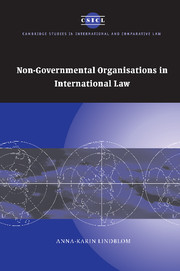Book contents
- Frontmatter
- Contents
- Acknowledgements
- List of abbreviations
- Part I Theoretical framework
- 1 The main issues and their context
- 2 Historical and conceptual background
- 3 International legal theory and non-state actors
- Part II Legal and empirical survey
- Part III Conclusion
- Bibliography
- Interviews
- Index
- CAMBRIDGE STUDIES IN INTERNATIONAL AND COMPARATIVE LAW
3 - International legal theory and non-state actors
Published online by Cambridge University Press: 12 August 2009
- Frontmatter
- Contents
- Acknowledgements
- List of abbreviations
- Part I Theoretical framework
- 1 The main issues and their context
- 2 Historical and conceptual background
- 3 International legal theory and non-state actors
- Part II Legal and empirical survey
- Part III Conclusion
- Bibliography
- Interviews
- Index
- CAMBRIDGE STUDIES IN INTERNATIONAL AND COMPARATIVE LAW
Summary
Introduction
Most topics of academic legal writings have probably been chosen because there are no answers, or contradictory ones, to a particular problem in the recognised legal sources. One approach is to choose, explicitly or implicitly, one of several international legal ‘methods’, ‘theories’ or ‘schools’, or to attempt to create a new one. If such a choice is explicitly described before the legal problem is embarked upon, the study is provided with a scholarly appearance. The idea of the investigation and the choice of method may seem to be the result of ‘some nonmethodological method, a nonpolitical academic standard that allows that method or politics to be discussed from the outside of particular methodological or political controversies’. Koskenniemi argues that the initial question of what method should be chosen for the study assumes:
the existence or accessibility of some perspective or language that would not itself be vulnerable to the objections engendered by the academic styles that carry labels such as ‘positivism’, ‘law and economics’, ‘international law and international relations’, ‘legal process’, ‘feminism’ and ‘critical legal studies’. But there is no such neutral ground.
Even if it were possible to choose a theory and method from such neutral ground, this choice would require a meta-method, which in turn would require a meta-meta method and so on. This, of course, is not how it happens, personal choices must be admitted at some point.
- Type
- Chapter
- Information
- Non-Governmental Organisations in International Law , pp. 79 - 118Publisher: Cambridge University PressPrint publication year: 2006



